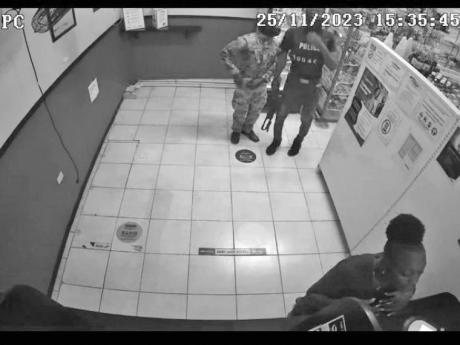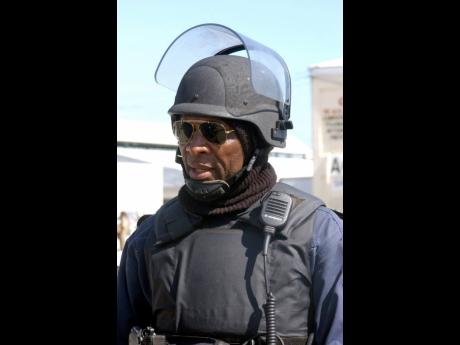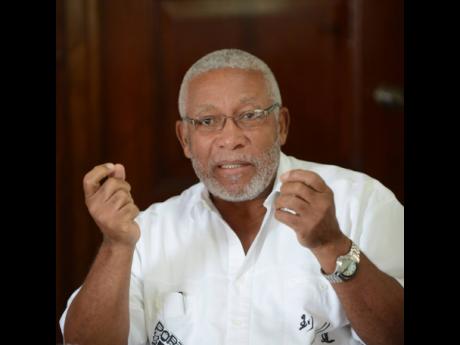UNIFORM LOOPHOLE
Law enforcement gear at risk of falling into criminal hands with lax return policy after resignations
Cops leaving the police force routinely flout a policy that requires them to return issued uniforms and equipment, and very often without any consequences, multiple ex-lawmen have disclosed.
A recent incident involving criminals dressed as police and soldiers has reignited public concerns and debate about the integrity of existing processes implemented by the police and the army to ensure that their uniforms do not fall into the hands of criminals.
Last weekend, thugs armed with high-powered weapons and dressed in police and military uniforms escaped with an undetermined sum of cash following a brazen daylight robbery at a pharmacy in Linstead, St Catherine. Video footage shows one of the robbers wearing what appeared to be a police ballistic vest.
In September last year, police personnel seized an M-16 rifle, along with uniforms belonging to the Jamaica Constabulary Force (JCF) and the Jamaica Defence Force (JDF), during an operation in Rose Gardens in Kingston.
And these are just two of several reports over the years of equipment belonging to the security forces being factored in criminal activities.
Some former members of the JCF told The Sunday Gleaner that there has been a breakdown in the enforcement of the policy for quite some time, noting that it was now common practice for cops to not return issued uniforms and gear.
Sometimes, they say, ex-cops ask family members to turn in uniforms and other government-issued items on their behalf, but they don’t always follow up on it.
“Back in the day, they used to force you to hand over your stuff even when you were going on vacation. Now it’s like happy-go-lucky,” said one ex-cop.
“You don’t necessarily have to hand over anything. They just give you the leave pass and you are good to go. There is no enforcement,” said one constable still enlisted in the JCF.
One former police sergeant, who submitted his resignation letter while on vacation overseas, confessed to The Sunday Gleaner that the uniforms issued to him are still at his home in Jamaica.
Earlier this year, a man posted pictures of what appeared to be police uniforms on a social media platform, saying he did not return them because they were not issued by the JCF, but were purchased with his own funds.
Several persons claiming to be former cops commented on the post, saying that they, too, had uniforms in their possession and would only return them if they were being refunded.
Other users of the platform boldly offered various sums to rent the uniforms.
STRICT POLICY FOR SOLDIERS
Conversely, some former members of the JDF shared with The Sunday Gleaner that strict enforcement of the military’s policy makes it extremely difficult for soldiers to hold on to uniforms and other equipment when they leave.
Two weeks before the resignation of a soldier takes effect, they are presented with a checklist of all items, including uniforms, that must be handed over before they are issued with a clearance certificate to leave the army, one former member explained.
Confirmation that the items have been returned goes through a multi-layered system with officers assigned at each stage to ensure that uniforms, weapons, lockers and areas of responsibility are intact, he explained.
“You need all the necessary officers to sign a document saying that you turned in everything and everyone put their signature and an official stamp,” the ex-soldier said.
Failure to account for uniforms or any parts of the weapon issued to each soldier, he said, constitutes a criminal offence.
“Everybody know that uniform is a prison matter. Dem treat uniforms just like a weapon,” he said.
‘COMPLIANCE RATE IS VERY, VERY HIGH’
The JCF said for “security reasons” it could not provide answers to some of the questions submitted by The Sunday Gleaner on Thursday about the enforcement of its policy for the return of government-issued properties.
Police spokeswoman Senior Superintendent Stephanie Lindsay acknowledged, however, that policemen and women are issued with uniforms annually or based on the need for new ones and insisted that “there is a robust policy that covers the management of uniforms”.
She said old uniforms are destroyed once they are returned to the police stores for replacement, and that members who are placed on suspension or resign are required to return all government-issued items, including uniforms.
“The compliance rate is very, very high,” Lindsay said in an email response to The Sunday Gleaner, noting that cops will not have their separation benefits finalised until they comply.
Up to late yesterday, the JDF did not respond to similar questions also submitted by The Sunday Gleaner on Thursday.
However, Rear Admiral Hardley Lewin, a former JDF chief of defence staff, explained that a soldier is required to give an explanation for any missing uniform and could face charges internally for losing government property.
The punishment depends largely on the circumstances of the case, Lewin said.
Ensuring the integrity of the guardrails around police and military uniforms is a significant public-interest issue, especially with the level of criminality in Jamaica, said one senior law enforcement official.
“We must have some concerns because it creates a scenario for citizens where the issue of confidence in both institutions is concerned,” said the official, who did not want to be identified.
“When they go out there to do legitimate work, how does the citizen determine who is legitimate?”
‘WE WERE NOT ALL ANGELS’
Current and former members of the JCF painted a picture of a free-for-all in the systems implemented to safeguard uniforms that would allow them to easily end up in the hands of the wrong people.
As an example, Reneto Adams, retired senior superintendent of police, said he was aware of cases where uniforms were left “carelessly all over the country”.
One of the ex-cops interviewed by The Sunday Gleaner recounted finding a set of police uniform “in a plastic bag in a yard” during an operation in a volatile inner-city community in St Andrew.
An investigation later revealed that a policeman previously lived at the house, but left a number of personal items behind when he moved to another home, according to the ex-cop, who did not want to be named.
Adams charged, too, that there were instances, during his tenure, where cops stole uniforms from their colleagues and passed them off to their “criminal contacts to be used for criminal activities”.
“We were not all angels,” said the popular crime-fighter during a Sunday Gleaner interview on Friday.
THEFT OF UNIFORMS STILL AN ISSUE
Theft of uniforms inside police stations remains an issue, one constable based in St Andrew said last week.
According to the constable, civilian workers employed at police stations sometimes steal police equipment, including uniforms, “and you also have police who give them thiefin’ fren the uniforms”.
“I accidentally left a peak cap in the station and when I went back minutes later, it was gone. Police thief it. My name is in it, but dem don’t care,” said the constable, relating one incident.
Another cop currently serving in the JCF recounted an incident in which a man who was hired to starch and iron a suit of uniform for a female sergeant delivered them to the police station where she was assigned.
“I told him where to put it, but when me reach work the space was there, but the uniform [shirt] gone … stolen from my locker,” she told him.
“You always hear the male cops dem a bawl out say somebody thief dem pants or dem shirt or dem shoes.”
Another major issue Adams said he encountered during his tenure was police uniforms left at dry-cleaning establishments for weeks.
“Unscrupulous people would have gone there to have them stolen or people who work at some of these dry cleaners would have them stolen and sold to criminals and others,” he charged.
A senior law enforcement official interviewed by The Sunday Gleaner disagreed with the assertion that criminals have easy access to police uniforms, but expressed concern that “accoutrements” issued to the security forces continue to feature in crimes.
“Even if it is one instance, it is one instance too many, and it’s something that we must have concerns about,” the official said.
The official confirmed that investigations have revealed that “in many instances”, persons who left the police force and the army are largely culpable of not returning their uniforms.
“We don’t know if some of them were deliberately done,” the official said.




